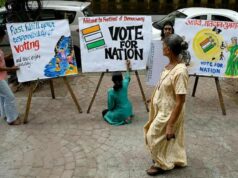Barkha Dutt Criticises BJP Government Again
Regard your soldiers as your children, and they will follow you into the deepest valleys; look on them as your own beloved sons, and they will stand by you even unto death”, says the ancient Chinese military treatise; the ‘Art of War’- attributed to Sun Tzu.
In our country, the heroism of the military – made even more poignant by the staggering humility of the Indian soldier – has been repeatedly brought home. It has stood by the citizenry not only ‘unto death’; but in every national crisis – riots, floods, earthquakes, evacuations – even crowd control. Soldiers have courageously gone to battle; but more than that they have helped to keep the peace. Even today a flag march by the Army – through neighbourhoods that have been divided by violence and hate or in the most volatile and scarred areas of insurgency zones – carries a moral authority and calming influence that no other institution does.
But there is a certain sanctity to the uniform that we need to respect at all times; its virtue cannot be confused with easy availability for jobs meant for others.
The soldier is not a ‘stepney’ to be brought in every time the vehicle of civil administration develops a snag; he is not a spare part meant to fix faulty administrative performances. Which is why, the decision by the government to use the Army to build foot-bridges in Mumbai – after a stampede at Elphinstone killed 23 people in September has created a gigantic furore.
We must ask: What is the accountability of the country’s richest civic body – the BMC’s budget this year was over 25,000 crore rupees – that it needs to deploy the military for a job that should squarely fall with its ambit? Where is the Public Works Department? And these are elected bodies that are able to take positions and express themselves freely in a way that a silent solder never can. If it is bridges today, will it be the cities killer – potholes – tomorrow?
I don’t disagree with the Railway Minister’s impulse to bring urgency to the matter – bureaucratic delays in a new tender for the Elphinstone bridge cost lives – and he is right in assessing that the Army will deliver ahead of deadline. But it’s one thing to count on the troops to build pontoons and baileys in emergencies or their aftermath; it’s quite another to use them in more controlled situations. The BJP is not the first party to have fallen back on the military because of civilian failure; the Congress did it too. During the commonwealth games when the UPA was in power, a suspension bridge crashed on the street. The Army was called in to reconstruct it in a record five days, saving India from international embarrassment.
The precedent set by either of these decisions is institutionally unhealthy. There is already seething, if unexpressed, resentment among soldiers at the overweening influence of ‘babudom’ in their lives and the lack of parity with the bureaucracy. While the military’s core characteristic is discipline and thus you will almost never hear a soldier complaining, a number of retired chiefs have spoken of the need for a greater say in decisions that are directly related to the military. The disquiet over the 7th Pay Commission and its perceived inequality in pay, pensions and stature between the civilian cadres and the military, was serious enough for the serving chiefs to write to the prime minister.
Though the government tried to address many anomalies under the Ashok Lavasa- led panel, the military is still angry at what it sees as a downgrading of its rank and authority. A high-level committee under the Defence Ministry to unpack these sensitive issues of equivalence has not reached any consensus yet. Promotions can be quicksilver in the bureaucracy and even in the police and paramilitary, compared to the military, creating an intractable set of inequities and problems in the chain of command, especially in areas where both are on duty together. And while the government has doubled the hardship allowance of soldiers at Siachen and in the Naxalite areas, there is still residual resentment over similar perks for bureaucrats in postings like Guwahati. Also don’t forget, while a civil servant retires at 60, 85% of the Army is compulsorily retired between 35 and 37.
If the military is going to be used to do the job of municipal bodies or the local police, the simmering tension in the civil-military equation over emoluments and status, will only worsen. Of course the Centre’s decision is guided by an entirely sincere intention; but it comes with risks and warnings. The soldier must never be used as a stop-gap




